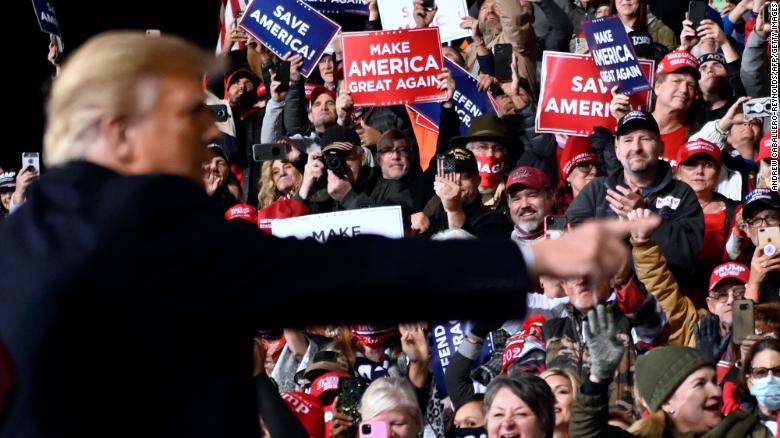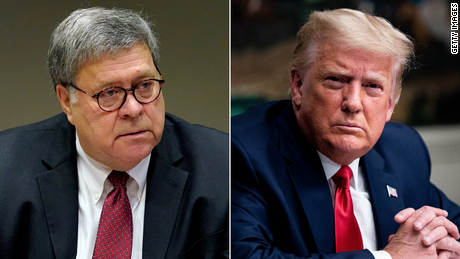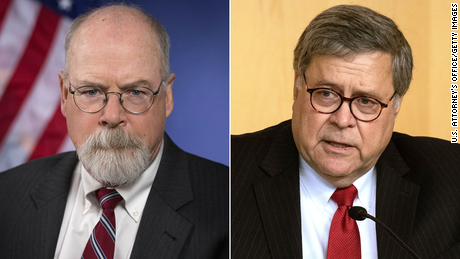Washington President Donald Trump is pushing extensively for the appointment of special counsels to separately investigate his baseless allegations of voter fraud and allegations surrounding Hunter Biden, the son of the President-elect, according to people familiar with the matter.
Trump has raised the idea in meetings with advisers, and has gone as far as asking for names of potential appointees to the special counsel positions, according to one of the people briefed on Trump’s conversations.
The issue of a special counsel appears poised to become a major issue in the final days of Trump’s presidency, when he works to finalize his long-sought priorities, hamstring the incoming administration and exact political revenge on those he believes wronged him during his tenure.
Trump remains deeply aggrieved at the special counsel investigation led by Robert Mueller into ties between his campaign and Russia.
Some of Trump’s aides have signaled to allies the President is intent on following through with the moves, though it remains unclear how or when Trump might press the issue at the Justice Department, which will undergo a change in leadership next week when Attorney General William Barr resigns.
Justice Department rules say a special counsel must be named by the attorney general, though Trump has quizzed his team whether he could name one himself, according to one person familiar with the matter.
If the incoming acting attorney general, Jeffrey Rosen, refuses to appoint the special counsels at Trump’s request, the President could fire him, the people said.
But currently there is no obvious replacement who might be more willing to fulfill Trump’s wishes. One person familiar with the matter predicted Trump would ultimately be talked out of firing Rosen, though at the end of his term he has become more unpredictable than ever.
Trump’s interest in special counsels was first reported by The Wall Street Journal and The Associated Press.
In addition to the special counsel issue, Trump is considering firing additional members of his administration and is mulling a long list of pardon requests.
Trump has voiced interest in a special counsel to look into voter fraud for several weeks, according to one person familiar with the matter. There has been no evidence to sustain his allegations of widespread voter fraud, and courts have repeatedly ruled against him as he seeks to overturn the results of the election.
His queries about a special counsel to look into Hunter Biden have come more recently, after it became public the younger Biden is under federal investigation related to his taxes.
The Hunter Biden investigation — and in particular the revelation that Barr kept it from becoming public before the election — has become a fixation of Trump’s as he wallows in his election loss. It caused an existing rift between the President and Barr to deepen, with Trump furious his attorney general hadn’t allowed the news to become public before voters cast ballots.
Ultimately, White House counsel Pat Cipollone brought the President and Barr together for a meeting on Monday that resulted in Barr submitting his resignation. Sources described the meeting as cordial, despite Trump’s anger, and the President tweeted afterward his relationship with Barr was “very good.”
It’s unclear whether Trump ever directly raised the idea of special counsels with Barr, though his interest in naming them has been known publicly and several of his allies have voiced their support.
The federal law governing special counsels lays out specific conditions under which an attorney general may appoint one, which don’t appear to have been met at this point. Those conditions include that an attorney general is recused and that the investigation presents a conflict of interest for the department, and that it’s in the public interest to appoint one.
But Trump administration lawyers likely can navigate past those requirements by appointing someone to act like a special counsel even if the requirements aren’t all in place, as Barr did in giving special counsel powers to John Durham, the Connecticut US attorney reinvestigating the Russia investigation.
Inside the Justice Department and the agencies leading the Hunter Biden probe, one concern remains that any intervention by Trump to appoint a special counsel could politicize and taint what officials consider to be a legitimate investigation, one person briefed on the matter said.
Senate Judiciary Chairman Lindsey Graham said Wednesday he has not spoken with Trump about appointing a special counsel to investigate Hunter Biden, but said he thinks it is a “good idea.” The South Carolina Republican said he believed a potential special counsel should look into not just allegations related to Biden’s taxes, but also his business dealings with other countries, including China and Ukraine.
Another of Trump’s allies on the Judiciary Committee, Sen. Chuck Grassley of Iowa, disagreed.
“If the Biden transition team speaks for Biden, and he says the President is not going to interfere with anything going on in the Justice Department, I don’t think we need a special counsel, but if we had a special counsel, it would obviously protect us from any possible interference,” Grassley said.
Democrats on the Judiciary panel said they believed the Hunter Biden matter was better left without a special counsel involved. Senate Minority Whip Dick Durbin noted that a the federal investigation into the younger Biden’s taxes has been going on “for some time now.”
“I hope that the selection of Attorney General by President Biden makes it clear that a person of honesty and integrity can take the first look at this and handle it properly,” he said.
On Monday, the Justice Department declined to comment on the prospect of a special counsel or Trump moving to fire Rosen.
In August, Rosen addressed his views of political interference at the Justice Department during a public conversation at the Center for Strategic and International Studies in Washington.
“I think it’s vital that we have trust in the independence and impartiality of our justice system because we’re a rule-of-law nation,” he said. “We’re a country where the rule of law governs. We’re not one where courts can proceed on the basis of arbitrariness, skew, whims, bias, political affiliation.”
>>>>






